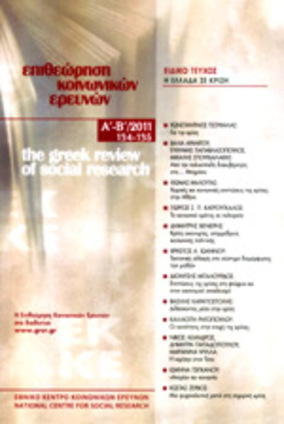Outbreaks of cholera, capitalism and humanitarianism : Power grabs and the unmaking of corporeality in Haiti and the Dominican Republic
Part of : Επιθεώρηση κοινωνικών ερευνών ; Vol.140/141, 2013, pages 185-201
Issue:
Pages:
185-201
Parallel Title:
Ξεσπάσματα χολέρας, καπιταλισμός και ανθρωπιστική δράση : Δίκτυα εξουσίας και η αποδιάρθρωση της σωματικότητας στην Αϊτή και στη Δομινικανή Δημοκρατία
Section Title:
Articles
Abstract:
The outbreak of cholera in Dominican Republic and Haiti following the 2010 Haitian earthquake led to shoring up national security regimes and placing the Haitianblack body and Haitian lands under intense scrutiny of geopolitical debates about humanitarianism and reconstruction. Reconstruction and biosecurity discourses,engaging with disease risks and minimizing contagion, deemphasized the various forms of slaughtering, death and profit making endeavors by foreign sovereignstates and organizations desiring to secure an imperial position in the world through a politics of slavery and wiping clean Haitian landscapes. The struggles of Haitians highlight how the imaginary and practices of neoliberal governancedepend on terror and rendering vast populations as living dead.
Subject:
Subject (LC):
Keywords:
Haiti, Cholera, slavery, reconstruction-as-death, corporeality, Αϊτή, χολέρα, δουλεία, ανασυγκρότηση-ως-θάνατος, σωματικότητα
Electronic Resources:
References (1):
- Aguilar E., 2013, «Online tools ‘decentralising disaster relief efforts’», SciDev/Net, http://www. scidev.net/en/new-technologies/news/online-tools-decentralising-disaster-relief-efforts-.html Berthoud H., 2012, Knowledge, attitudes, and practices around peri-urban and rural water access and sanitation during a cholera outbreak: A comparison of two communities in the Puerto Plata Region, Dominican Republic, University of Washington: A Thesis for the Master of Public Health. CISET. 1995, «Global microbial threats in the 1990s», Report of Committee on International Science, Engineering and Technology’s Working Group on Emerging and Reemerging Infectious Diseases. Washington, DC: National Science & Technology Council, http://www. ostp.gov/CISET/html/ciset.html. Cooper C., 2011, “Experimental Republic: Medical accidents (productive and unproductive) in Post-Socialist China», EASTS, 5(3), pp. 313-327. Dantò E., 2010, «Who is Rajiv Shah, what are Haiti concerns about Shah/USAID», Open Salon, July 10, http://open.salon.com/blog/ezili_danto/2010/07/10/who_is_rajiv_shah_what_are_ haiti_concerns_about_shahusaid. Fanon F., 1967, Wretched of the earth, New York, Grove. Foucault M., 1974, «The crisis of medicine or the crisis of antimedicine?», Foucault Studies, 1, pp. 5-19. Hamlin C., 2009, Cholera: The biography, Oxford, Oxford University Press. IMF. 2010, «Action Plan For National Recovery and Development of Haiti», March 2010. http://www.haiticonference.org/Haiti_Action_Plan_ENG.pdf. Kivland C., 2013, «On accidental recoveries and predictable disasters: The Haitian earthquake three years later», Fieldsights - Episcope, Cultural Anthropology Online, http://production. culanth.org/fieldsights/53-on-accidental-recoveries-and-predictable-disasters-the-haitianearthquake-three-years-later. Knox R., 2013, «“After bringing cholera to Haiti, U.N. plans to get rid of it”, Shots: Health News from NPR», http://www.npr.org/blogs/health/2013/01/12/169075448/after-bringingcholera-to-haiti-u-n-plans-to-get-rid-of-it. McClintock A., 2013, «A patriarchy of soaps», Anti Essays, http://www.antiessays.com/freeessays/256026.html. PAHO 2011, «Epidemiological alert: Update on the Cholera Situation», December 1, http:// new.paho.org/hq/dmdocuments/2010/epi_alert_1_december_2010_Cholera_Outbreak3.pdf Redfield P., 2012, «Bioexpectations: Life technologies as humanitarian goods», Public Culture, 24(1), pp. 157-184. Rose N., 2006, The politics of life itself: Biomedicine, power, and subjectivity in the twenty-first century, Princeton, Princeton University Press. Sexton J., 2010 (a), «“The Curtain of the Sky”: An Introduction», Critical Sociology, 36, pp. 11-24. — 2010b, «People-of-color-blindness: Notes on the afterlife of slavery», Social Text, 103 (2010b), pp. 31-56. — 2007, «Racial profiling and the societies of control», in Warfare in the American Homeland: Prisons and policing in a penal democracy. Ed. J. James. Durham: Duke University Press. — 2006, «Race, nation, and empire in a blackened World», Radical History Review 95(Spring), pp. 251-52. Smucker G., 2007, «Environmental vulnerability in Haiti», Washington DC, USAID Report. Tappero J.W., Tauxe R.V., 2011, «Lessons learned during public health response to cholera epidemic in Haiti and the Dominican Republic», Emergency Infectious Disease, November 2, http ://dx.doi.org/10.3201/eid1711.110827. UN Committee on Elimination of Racial Discrimination in DR. 2013, http://www.unog.ch/802 56EDD006B9C2E/%28httpNewsByYear_en%29/E826747DF6291A23C1257B1D004DBED0 ?OpenDocument «Vision and Roadmap for Haiti», 2010, Prepared by the Private Sector Economic Forum, March 23, http://developinnovations.com/data/images/haiti-forum-and-roadmap_100323-final-draft_wcomplete-annexes_ld250310.pdf. Wald P., 2008, Contagious: Cultures, carriers, and the outbreak narrative, Durham, Duke UP. Walton D.A., Ivers L., 2011, «Responding to cholera in post-earthquake Haiti», New England Journal of Medicine 364(1), pp.3-5. Wilderson F., 2010, Red, white & black, Durham, Duke University Press. Williams J.P., 2010, «Hidden Cost of DNA Banking», The Nation, April 12, http://www.thenation.com/article/hidden-cost-dna-banking




